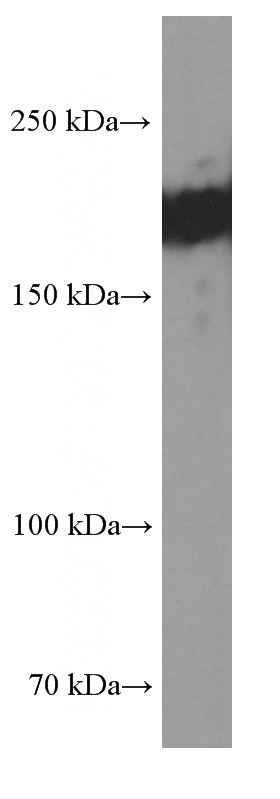-
Product Name
SETDB1 antibody
- Documents
-
Description
SETDB1 Mouse Monoclonal antibody. Positive WB detected in human heart tissue, HEK-293 cells. Observed molecular weight by Western-blot: 170-180
-
Tested applications
ELISA, WB
-
Species reactivity
Human; other species not tested.
-
Alternative names
ESET antibody; H3 K9 HMTase 4 antibody; H3 K9 HMTase4 antibody; KG1T antibody; KIAA0067 antibody; KMT1E antibody; Lysine N methyltransferase 1E antibody; SET domain bifurcated 1 antibody; SET domain antibody; bifurcated 1 antibody; SETDB1 antibody
- Immunogen
-
Isotype
Mouse IgG1
-
Preparation
This antibody was obtained by immunization of SETDB1 recombinant protein (Accession Number: NM_001393964). Purification method: Protein G purified.
-
Clonality
Monoclonal
-
Formulation
PBS with 0.02% sodium azide and 50% glycerol pH 7.3.
-
Storage instructions
Store at -20℃. DO NOT ALIQUOT
-
Applications
Recommended Dilution:
WB: 1:2000-1:20000
-
Validations

human heart tissue were subjected to SDS PAGE followed by western blot with Catalog No:107530(SETDB1 Antibody) at dilution of 1:8000
-
Background
SETDB1, also named as ESET, KIAA0067 and KMT1E, belongs to the histone-lysine methyltransferase family. It is a SET domain protein with histone H3-K9-specific methyltransferase activity. H3 'Lys-9' trimethylation is coordinated with DNA methylation and represents a specific tag for epigenetic transcriptional repression by recruiting HP1 (CBX1, CBX3 and/or CBX5) proteins to methylated histones. SETDB1 mainly functions in euchromatin regions, thereby playing a central role in the silencing of euchromatic genes. It probably forms a complex with MBD1 and ATF7IP that represses transcription and couples DNA methylation and histone 'Lys-9' trimethylation. Its activity is dependent on MBD1 and is heritably maintained through DNA replication by being recruited by CAF-1. SETDB1 regulates histone methylation, gene silencing, and transcriptional repression. It has been identified as a target for treatment in Huntington Disease, given that gene silencing and transcription dysfunction likely play a role in the disease pathogenesis.
Related Products / Services
Please note: All products are "FOR RESEARCH USE ONLY AND ARE NOT INTENDED FOR DIAGNOSTIC OR THERAPEUTIC USE"
